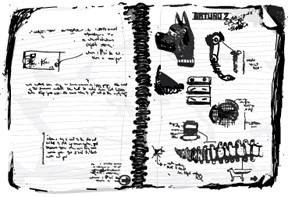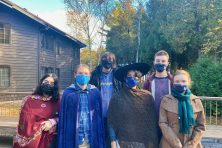The Journey of John Winstead
- Share
- Tweet
- Pin
- Share
FICTION
John Winstead made a left onto 4th Avenue and parked on the right side of the decidedly narrow downtown street. The spot he picked was located directly across from the Main Street Pub.
As he turned his car off, he remembered the conversation that drove him from his house and his wife earlier that evening.
It had been an argument, of course. But it hadn’t been one of those arguments that started over something trivial and spiraled dangerously out of control, like so many stupid marital arguments do.
It was an argument that was always about what it was about. And what it was about was a house.
“I think we should buy,” said Julie, as she lay next to John in their small, double bed in their small, rented apartment. “The economy’s coming back, and land is only going to go up.”
“The economy’s not coming back,” said John.
“That’s not really the issue,” said Julie, touching his chest and smiling. “We have the money, John. We both have jobs that we like, in a place that we like.”
Julie was a baker. She worked at a café downtown, not very far from the Main Street Pub, and waitressed a little on the side to bring in some extra money.
John was a manager at a software company that had started up in town a couple months ago. His job paid pretty well and wasn’t terrible, but to say that he liked it may have been a bit of a stretch.
In the bottom right drawer of John’s work desk, underneath a stack of files and protocols, sat a worn notebook. It wasn’t a work notebook. Rather, it was a notebook he had kept since he took a robotics course during his senior year of college.
Most of its pages were simply full of notes and strange doodles, but a couple of pages near the back were special. They contained John’s plans and schematics for his college masterpiece, the ultimate robot dog: Arturo the Second. A metal companion better than any real dog because he could never, ever die.
(Arturo the First, John’s first dog, had been run over when John was eight. The incident had clearly left an impression.)
John submitted the plans as part of his final for the class, but he did not actually build the dog. Two months after graduation, when John and Julie were putting together their wedding registry, John wanted to put a listing on Amazon.com of the parts he needed for Arturo the Second.
Julie talked him out of it, saying that she hadn’t registered any scented candles or bath salts, so John shouldn’t register Arturo. They were only asking for things which were useful.
“I mean come on, I let you put that power saw on there,” she said, standing in their bedroom door four months before the wedding. She had just changed into a t-shirt and pajama pants.
“We need that,” said John, who standing over the sink, cleaning up from dinner. It had been his turn to cook. “For…sawing things.”
“When have you ever sawed anything?” asked Julie. “Your mom told me you were frightened of power tools when you were a kid. And in high school, when your dad told you to take woodworking you took home ec just to piss him off.”
“I liked cooking!” said John.
“And I’m grateful for that,” said Julie. “Let me show you how grateful.”
Five years had passed since that robotics class, but every couple of months or so, John would still take out the notebook with the plans for Arturo in it. He’d look at them, visit Amazon.com, start pricing materials. But he never followed through.
He still hadn’t built his robot dog. Now, he was supposed to build a house.
The comparison was stupid, John knew. It didn’t make sense. And if he really wanted the time to build Arturo, he would have found it somehow.
But it was something he hadn’t done yet, just as he hadn’t hiked through the Australian outback, learned French, gone on Jeopardy, thrown beads at large breasted women during Mardi Gras, or taught English in a hut in Guatemala.
And now he was supposed to build a house.
All of this raced through John’s mind as he prepared to respond to Julie, but it raced so fast that he was barely able to comprehend it, much less put it into words. So what came out was this: “We’re only twenty-seven, Julie. Do we really want a house?”
She did. She really did. And she thought that he really should too. After all, they had what they had always wanted. It was time to move on to the next step.
“It’s past time,” she said.
But he would not yield. His doubt, even un-quantified, was too great. So they fought. And they kept fighting. And, eventually, when he got tired of the stalemate and the pointlessness of it all, John put on some clothes, walked into the garage, and took the car out for a ride.
There was music coming out of the pub as John exited his car. It was jukebox music, which wasn’t surprising to John. He’d just left the grocery store where Beth, the guitarist for tonight’s band was working, and she had still been on duty.
He figured he’d arrive at the pub a little early, grab a beer. See if anyone he knew was there, although he doubted it. And he’d wait for Beth and her long, braided ponytail to walk in the door, trying all the while to figure out how to make the situation seem less awkward and morally compromising than it was in his head.
Because he really just wanted a beer and an excuse to stay away from home a little longer, to put everything off. The trip to the pub would be completely harmless.


